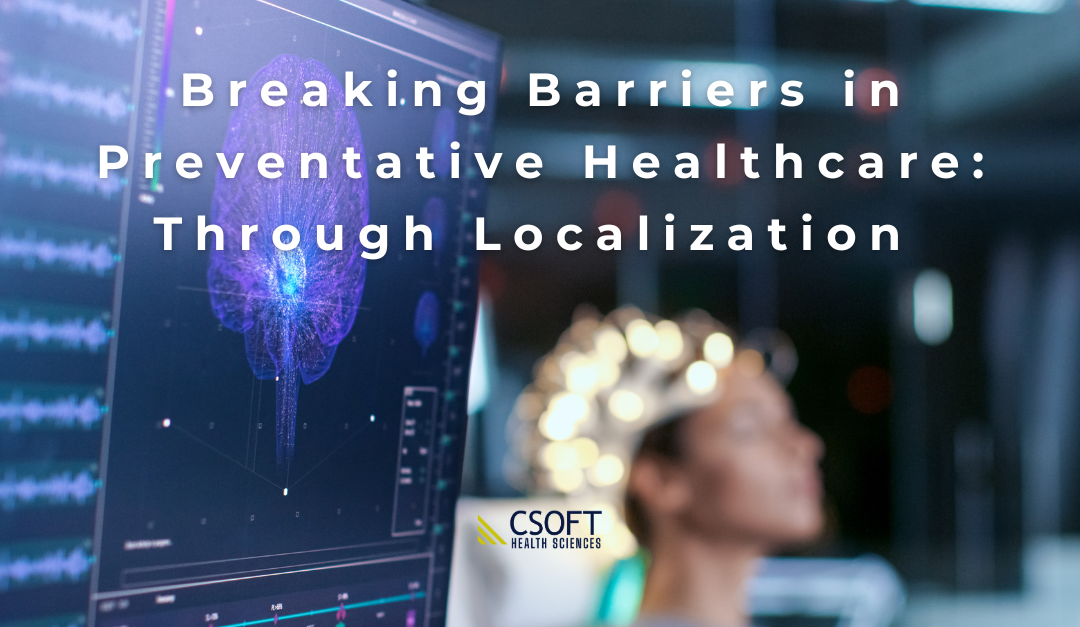In today’s rapidly evolving global healthcare landscape, prioritizing preventative measures has become imperative amid the rising prevalence of chronic diseases. Preventative healthcare strategies, aimed at anticipating health issues rather than merely reacting to them, are crucial for enhancing overall well-being and extending longevity. Localization emerges as a critical tool within this paradigm, tailoring interventions, and resources to diverse cultural contexts. By ensuring that preventive strategies are not only accessible but also culturally resonant, localization enhances engagement, adherence, and effectiveness, thereby contributing to improved global health outcomes.
Localization plays a crucial role in the effective implementation of preventive healthcare measures. Translating and adapting healthcare materials to fit diverse cultural contexts ensures that valuable information is understood and acted upon by diverse populations. Accurate translation is essential during clinical trials, to ensure that these forms are properly localized to reach a broader population and to ensure patient commitment, including Informed Consent Forms (ICFs), Adverse Drug Reactions (ADRs), Instructions for Use (IFUs), and Summary of Product Characteristics (SmPC). CSOFT Health Sciences prioritizes accurately translating crucial documents to ensure global access to preventive healthcare. Our localization efforts help ensure that healthcare innovations are effectively communicated to a global audience.
Engaged and informed patients are more likely to adhere to these measures, leading to better health outcomes
Patients play a crucial role in the success of preventive healthcare strategies. Ensuring that patients are active participants in their healthcare journey enhances the effectiveness of these strategies. Educating patients about the importance of preventive measures empowers them to take charge of their health. This includes understanding risk factors, adhering to screening schedules, and making informed lifestyle choices. Prevention often requires significant lifestyle changes, such as improving diet, increasing physical activity, and quitting smoking. Patient involvement and commitment to these changes are vital for the success of preventive strategies.
Localization makes sure that preventive healthcare strategies are effectively communicated to and embraced by diverse populations. It involves adapting healthcare messages to be culturally relevant and understandable to various demographic groups, ensuring that patients from diverse cultural backgrounds are part of the solution. Health messages need to resonate with different populations’ cultural values and beliefs. Localization helps frame these messages in a culturally sensitive way and is more likely to be accepted and acted on.
Engaging local communities in developing and disseminating preventive health strategies enhances their effectiveness. Community leaders and influencers can play a key role in promoting preventive measures within their communities. Localization provides insights into the health behaviors and preferences of different populations. This understanding helps design tailored preventive interventions that are more likely to succeed.
The Role of Localization in Preventive Healthcare
Healthcare strategies should be customized to suit various cultures and languages to ensure their effectiveness. Health information must be easily comprehensible and relatable as it encourages adherence to preventive measures. This approach can contribute to improved overall health and reduced healthcare costs for all. Adapting healthcare strategies ensures that everyone regardless of their background or language, can access the care they require.
The World Health Organization (WHO) implemented a comprehensive localization strategy to combat HIV/AIDS in sub-Saharan Africa, recognizing the need to tailor preventive healthcare measures to diverse cultural contexts. This initiative involved translating and adapting educational materials into local languages and aligning content with cultural norms and practices. Engaging local community leaders and healthcare workers, the WHO successfully increased awareness and adherence to preventive measures, leading to tangible improvements in health outcomes. This case study illustrates the effectiveness of preventative healthcare localization in bridging cultural divides and empowering communities to adopt proactive health behaviors.
Preventive healthcare is crucial for reducing long-term illnesses, improving life quality, and cutting down on healthcare expenses. Customizing these strategies for different cultures and populations is a key step in making them effective. By involving patients in their healthcare and making health information fit their cultural norms, we can make preventive healthcare more effective and work towards a healthier future for everyone.
At CSOFT Health Sciences, we strive to bring medical advancements to patients globally, using innovative technology accessible to people of different languages and cultures. We work with top technological innovators to develop advanced medical solutions and customize these technologies for effective use by people from diverse backgrounds. Our goal is to improve the quality of care universally, making life-saving treatments and preventive healthcare measures available to all, regardless of language or location.
CSOFT Health Sciences at the DIA 2024
CSOFT Health Sciences is attending the DIA 2024 conference in San Diego, “Redefining Healthcare through Innovation and Collaboration.” Our goals for this respected event go beyond just local impact; we aim to spot emerging trends and technologies, encourage meaningful partnerships that go beyond geographical barriers, and make preventive healthcare a reality for everyone. We are committed to linguistic precision and cultural awareness, and devoted to helping pharmaceutical companies expand the availability of treatments and medications to diverse patient populations worldwide.
Meet Us at DIA in booth #1611!
